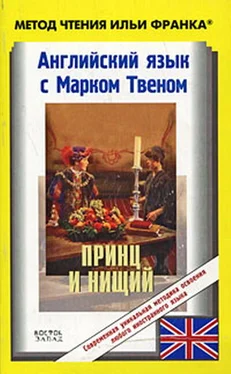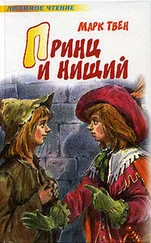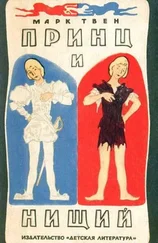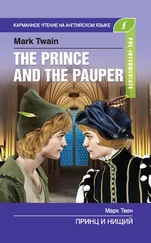After grace (после молитвы), Tom (being instructed) (Том, будучи проинструктирован) rose (встал; to rise — вставать) — and the whole house with him (и все присутствующие с ним) — and drank from a portly golden loving-cup (и выпил из внушительной золотой круговой чаши) with the Princess Elizabeth (с принцессой Элизабет); from her it passed to the Lady Jane (от нее она перешла к леди Джейн), and then traversed the general assemblage (и затем обошла все собрание). So the banquet began (так пир начался).
continuous [kən`tınjuəs], jewry [`Guərı], receive [rı`si:v]
THE royal barge, attended by its gorgeous fleet, took its stately way down the Thames through the wilderness of illuminated boats. The air was laden with music; the river-banks were beruffled with joy — flames; the distant city lay in a soft luminous glow from its countless invisible bonfires; above it rose many a slender spire into the sky, incrusted with sparkling lights, wherefore in their remoteness they seemed like jeweled lances thrust aloft; as the fleet swept along, it was greeted from the banks with a continuous hoarse roar of cheers and the ceaseless flash and boom of artillery.
To Tom Canty, half buried in his silken cushions, these sounds and this spectacle were a wonder unspeakably sublime and astonishing. To his little friends at his side, the Princess Elizabeth and the Lady Jane Grey, they were nothing.
Arrived at the Dowgate, the fleet was towed up the limpid Walbrook (whose channel has now been for two centuries buried out of sight under acres of buildings) to Bucklersbury, past houses and under bridges populous with merry-makers and brilliantly lighted, and at last came to a halt in a basin where now is Barge Yard, in the center of the ancient city of London. Tom disembarked, and he and his gallant procession crossed Cheapside and made a short march through the Old Jewry and Basinghall Street to the Guildhall.
Tom and his little ladies were received with due ceremony by the Lord Mayor and the Fathers of the City, in their gold chains and scarlet robes of state, and conducted to a rich canopy of state at the head of the great hall, preceded by heralds making proclamation, and by the Mace and the City Sword. The lords and ladies who were to attend upon Tom and his two small friends took their places behind their chairs.
At a lower table the court grandees and other guests of noble degree were seated, with the magnates of the city; the commoners took places at a multitude of tables on the main floor of the hall. From their lofty vantage-ground, the giants Gog and Magog, the ancient guardians of the city, contemplated the spectacle below them with eyes grown familar to it in forgotten generations. There was a bugle-blast and a proclamation, and a fat butler appeared in a high perch in the leftward wall, followed by his servitors bearing with impressive solemnity a royal Baron of Beef, smoking hot and ready for the knife.
After grace, Tom (being instructed) rose — and the whole house with him — and drank from a portly golden loving-cup with the Princess Elizabeth; from her it passed to the Lady Jane, and then traversed the general assemblage. So the banquet began.
By midnight the revelry was at its height (к полуночи пирушка была «на своей высоте» = в самом разгаре). Now came one of those picturesque spectacles (теперь началось одно из тех живописных зрелищ) so admired (которым так любовались) in that old day (в том старое время). A description of it is still extant in the quaint wording of a chronicler who witnessed it (описание его до сих пор сохранилось в старомодном изложении хроникера, которые стал его свидетелем):
'Space being made (когда пространство было сделано = расчищено), presently entered a baron and an earl (вскоре вошли барон и граф) appareled after the Turkish fashion (наряженные по турецкой моде) in long robes of bawdkin powdered with gold (в длинные платья из парчи, усыпанной золотом); hats on their heads of crimson velvet (шляпы на их головах из малинового бархата), with great rolls of gold (с большими «трубочками» из золота), girded with two swords (опоясанные двумя мечами), called simitars (называемыми симитары), hanging by great bawdricks of gold (свисающими на поясах из золота). Next came yet another baron and another earl (затем вошли еще один барон и еще один граф; to come — приходить), in two long gowns of yellow satin (в двух длинных одеждах из желтого атласа), traversed with white satin (пересеченных белым атласом), and in every bend of white was a bend of crimson satin (и в каждой полосе белого была полоса малинового атласа), after the fashion of Russia (по русской моде), with furred hats of gray (с меховыми шапками серого цвета) on their heads (на их головах); either of them having an hatchet in their hands (каждый из них имеющий топорик в руках), and boots with pykes points a foot long (и башмаки с носами в фут длиной), turned up (поднятыми кверху). And after them came a knight (а после них пришел рыцарь), then the Lord High Admiral (затем лорд-адмирал), and with him five nobles (и с ним пять дворян), in doublets of crimson velvet (в камзолах из малинового бархата), voyded low on the back and before to the cannel-bone, laced on the breasts with chains of silver (низко вырезанных сзади, а спереди — до самых ключиц, завязанные на груди серебряными цепочками); and, over that (и, поверх этого), short cloaks of crimson satin (короткие плащи из малинового атласа), and on their heads (а на их головах) hats after the dancers' fashion (шляпы по моде танцоров), with pheasants' feather in them (с фазаньим пером в них). These were appareled after the fashion of Prussia (эти были наряжены по моде Пруссии). The torch-bearers (факельщики), which were about an hundred (которых было около сотни), were appareled in crimson satin and green (были одеты в малиновый атлас и зеленый), like Moors (как мавры), their faces black (их лица были черными). Next came in a mommarye (затем вошли ряженые). Then the minstrels (затем менестрели), which were disguised (которые были замаскированы), danced (плясали); and the lords and ladies did wildly dance also (и господа и дамы рьяно: «дико» отплясывали тоже), that it was a pleasure to behold (так что это было удовольствие смотреть).'
And while Tom, in his high seat (и пока Том в своем высоком сиденье), was gazing upon this 'wild' dancing (смотрел на этот бешеный танец), lost in admiration of the dazzling commingling of kaleidoscopic colors (погрузившийся в любование мерцающей смеси калейдоскопических цветов) which the whirling turmoil of gaudy figures (которую крутящийся круговорот пестрых фигур) below him presented (под ним представлял), the ragged but real Little Prince of Wales (потрепанный, но настоящий маленький принц Уэльский) was proclaiming his rights and his wrongs (рассказывал все о себе: «добро и зло»), denouncing the impostor (обличая самозванца), and clamoring for admission at the gates of Guildhall (и шумно требуя, чтобы его пропустили к воротам Ратуши)! The crowd enjoyed this episode prodigiously (толпа наслаждалась этой сценой колоссально), and pressed forward (и наседала) and craned their necks to see the small rioter (и свернула шеи, чтобы увидеть маленького бунтаря; riot — бунт). Presently they began to taunt him and mock at him (вскоре они начали насмехаться над ним и дразнить его), purposely to goad him (с целью побудить его) into a higher and still more entertaining fury (к еще более высокой = сильной и еще более веселящей ярости). Tears of mortification sprung to his eyes (слезы обиды подступили к его глазам), but he stood his ground (но он стоял на своем) and defied the mob right royally (и бросал вызов толпе по-королевски). Other taunts followed (другие = новые насмешки последовали), added mockings stung him (добавленные издевки жалили его; to sting — жалить), and he exclaimed (и он воскликнул):
Читать дальше
Конец ознакомительного отрывка
Купить книгу




![Марк Твен - Принц и нищий [Издание 1941 г.]](/books/148799/mark-tven-princ-i-nichij-izdanie-1941-g-thumb.webp)







